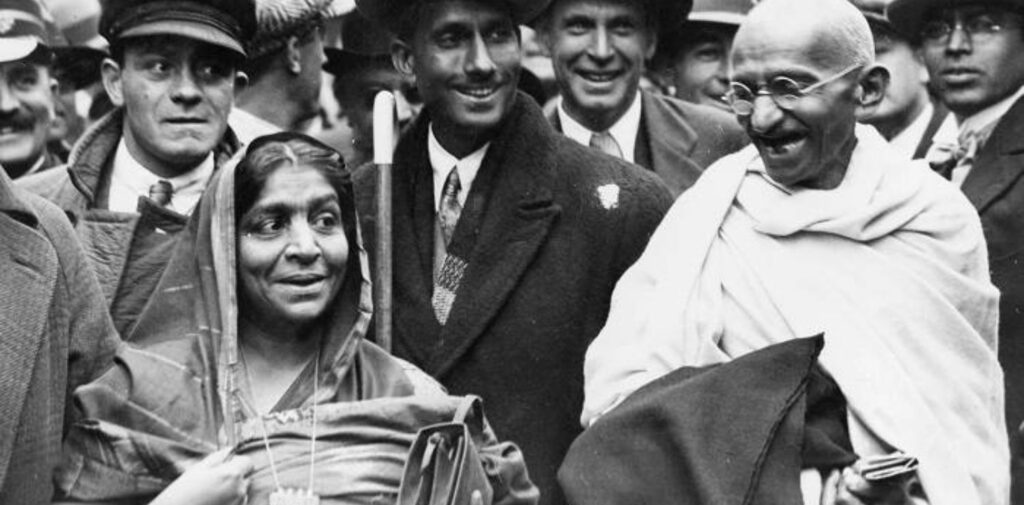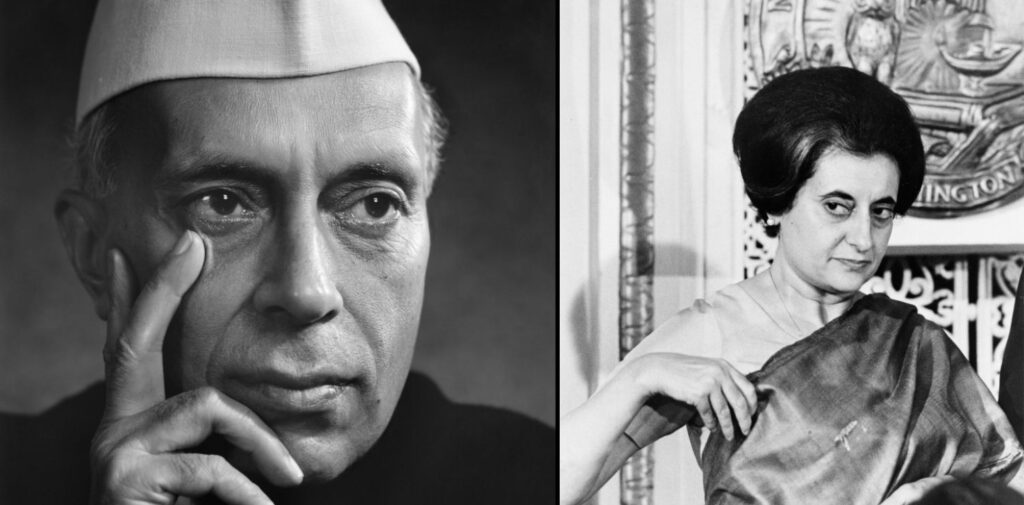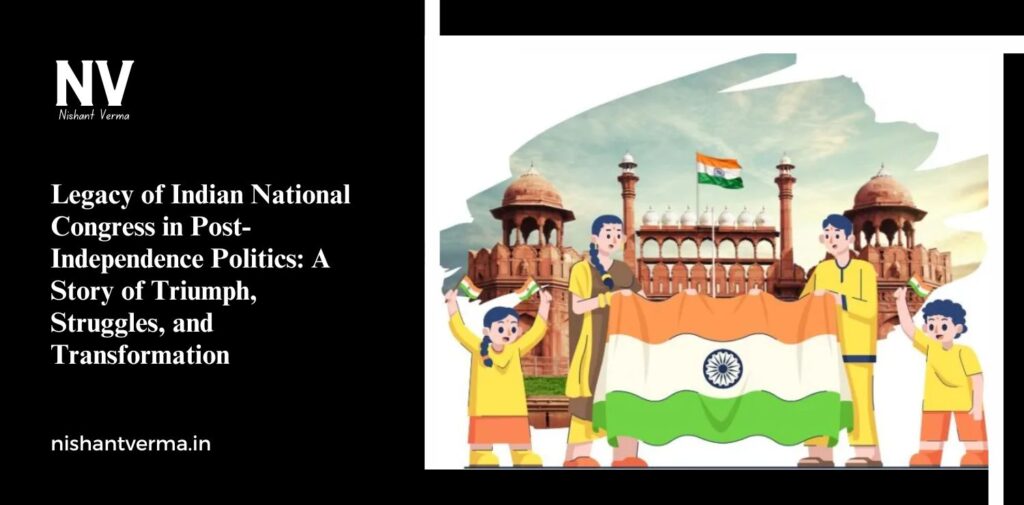The Indian National Congress (INC) has played an essential role in shaping India’s political landscape post-independence. Founded in 1885, the INC was at the forefront of India’s struggle for freedom from British colonial rule. After India gained independence in 1947, the Congress continued to be a dominant force in the country’s politics. Its influence, both positive and negative, shaped the direction of India for decades.
In this article, we will explore the legacy of Indian National Congress in post-independence politics, examining its achievements, challenges, and transformation over the years.
A Dominant Force in the Early Years of Independence
When India gained independence in 1947, the Indian National Congress was the leading political party in the country. The Congress had led the struggle for freedom and had the trust of the masses. Jawaharlal Nehru, the first Prime Minister of India, was a prominent Congress leader who played a crucial role in shaping the new nation. Under his leadership, the Congress was able to set the political and economic foundations for a newly independent country.
The Congress, initially, focused on building a democratic and secular India. It worked toward uniting the diverse population of the country, comprising various religions, languages, and cultures. Nehru’s vision of a strong, unified, and modern India was a guiding force for the Congress in the years following independence.
One of the major accomplishments of the Congress was the framing of the Indian Constitution. The INC played an essential role in the Constituent Assembly, which laid down the framework for India’s democratic system. This Constitution, adopted in 1950, is a living document that continues to guide the functioning of Indian democracy.
Another significant achievement was the adoption of a mixed economy. The Congress believed that India should take a balanced approach to development—encouraging both public and private sectors to work together. Nehru’s focus on industrialization and modernizing agriculture helped India make significant strides in economic development in the early years of independence.

The Era of Political Dominance: Nehru to Indira Gandhi
The Congress party enjoyed a period of political dominance from the 1950s to the 1970s. Under Nehru’s leadership, the Congress won several general elections, and the party’s influence remained unchallenged for nearly two decades. However, after Nehru’s death in 1964, the Congress underwent a leadership transition. His daughter, Indira Gandhi, emerged as a powerful leader and assumed the role of Prime Minister in 1966.
Indira Gandhi brought a new dimension to the Congress’ legacy. She was a strong and charismatic leader who was unafraid to make bold decisions. Her tenure was marked by several significant events, such as the nationalization of banks in 1969, which was aimed at redistributing wealth and promoting economic equality. The Green Revolution, which led to significant increases in agricultural production, also took place during her time in power.
Indira Gandhi’s leadership was also marked by her focus on social welfare programs and poverty reduction. Her government launched several initiatives aimed at improving the lives of India’s poor, such as the Food for Work program, which provided employment to rural populations and increased food production.
However, her tenure was not without controversy. In 1975, facing political unrest and rising opposition, Indira Gandhi declared a state of emergency. During the Emergency, civil liberties were suspended, and political opponents were imprisoned. This period remains one of the most controversial chapters in India’s post-independence history.
Despite the criticisms of her leadership during the Emergency, Indira Gandhi continued to be a central figure in Indian politics until her assassination in 1984. Her legacy within the Congress was undeniable, and her death created a vacuum that had significant repercussions for the party in the years that followed.

Challenges and Decline of the Congress in the 1980s and 1990s
Following Indira Gandhi’s assassination, the Congress party experienced a period of instability. Rajiv Gandhi, Indira Gandhi’s son, became the Prime Minister, but his leadership was overshadowed by the growing complexity of Indian politics and the rise of new political forces.
The 1980s and 1990s saw the rise of regional parties and the decline of the Congress’ dominance. The economic policies of the Congress government, which had been centered on state control and protectionism, were increasingly viewed as outdated. India faced significant economic challenges during this period, including a balance of payments crisis in 1991. The crisis led to a shift in economic policy, with India adopting economic reforms such as liberalization, privatization, and globalization.
During this period, the Congress struggled to maintain its traditional influence. The party faced internal divisions, with many leaders breaking away to form their own factions or regional parties. The rise of the Bharatiya Janata Party (BJP), a right-wing party with strong Hindu nationalist leanings, further eroded the Congress’ support base.
Despite the challenges, the Congress managed to remain a major political player in Indian politics. In 1991, under the leadership of P. V. Narasimha Rao, the Congress government introduced landmark economic reforms that transformed India’s economy. These reforms led to rapid economic growth and opened up the country to global markets, marking a turning point in India’s development.

Congress in the 21st Century: Resilience and Transformation
The Congress party faced further challenges in the 21st century. The rise of the BJP as a major political force, along with the growing influence of regional parties, made it difficult for the Congress to maintain its dominant position. The Congress suffered defeats in general elections in 1996, 1998, and 1999, and its position as the largest party in the Indian parliament was increasingly challenged.
However, the Congress experienced a revival in the 2000s, particularly under the leadership of Sonia Gandhi and the election of Dr. Manmohan Singh as Prime Minister in 2004. The Congress-led United Progressive Alliance (UPA) government introduced several key reforms, including the Right to Information Act, the National Rural Employment Guarantee Act, and the Right to Education Act. These reforms aimed at empowering India’s marginalized communities and promoting social justice.
The Congress also played a significant role in the India-US nuclear deal, which marked a new phase in India’s foreign policy, strengthening ties with the United States.
Despite these successes, the Congress faced several setbacks in the 2010s. The party was severely criticized for corruption scandals, including the 2G spectrum scam and the Commonwealth Games scam. These scandals damaged the party’s image and led to a decline in its popularity.
In the 2014 general elections, the Congress suffered a massive defeat, with the BJP led by Narendra Modi emerging as the dominant political force in India. The Congress struggled to recover from this blow, and its performance in subsequent elections has been inconsistent.
Conclusion: Legacy of Indian National Congress
The Indian National Congress has had a profound impact on the political landscape of post-independence India. From leading the freedom struggle to shaping the country’s early years of independence, the Congress has been a key player in the development of modern India. The leadership of figures like Jawaharlal Nehru and Indira Gandhi left an indelible mark on the country’s politics, economy, and society.
However, the Congress has also faced significant challenges, including internal divisions, the rise of new political forces, and issues of corruption. Despite these difficulties, the party has shown resilience and continues to play an important role in Indian politics.
As we look to the future, the legacy of the Indian National Congress remains a complex one—marked by both achievements and controversies. While its dominance has waned in recent years, the Congress’ contribution to India’s political and social development cannot be overlooked. The party’s journey reflects the evolving nature of India’s democracy and its constant quest for progress and reform.
Ultimately, the legacy of the Indian National Congress is not just a story of political power but a reflection of the ongoing struggle for justice, equality, and democratic governance in a diverse and dynamic nation.




